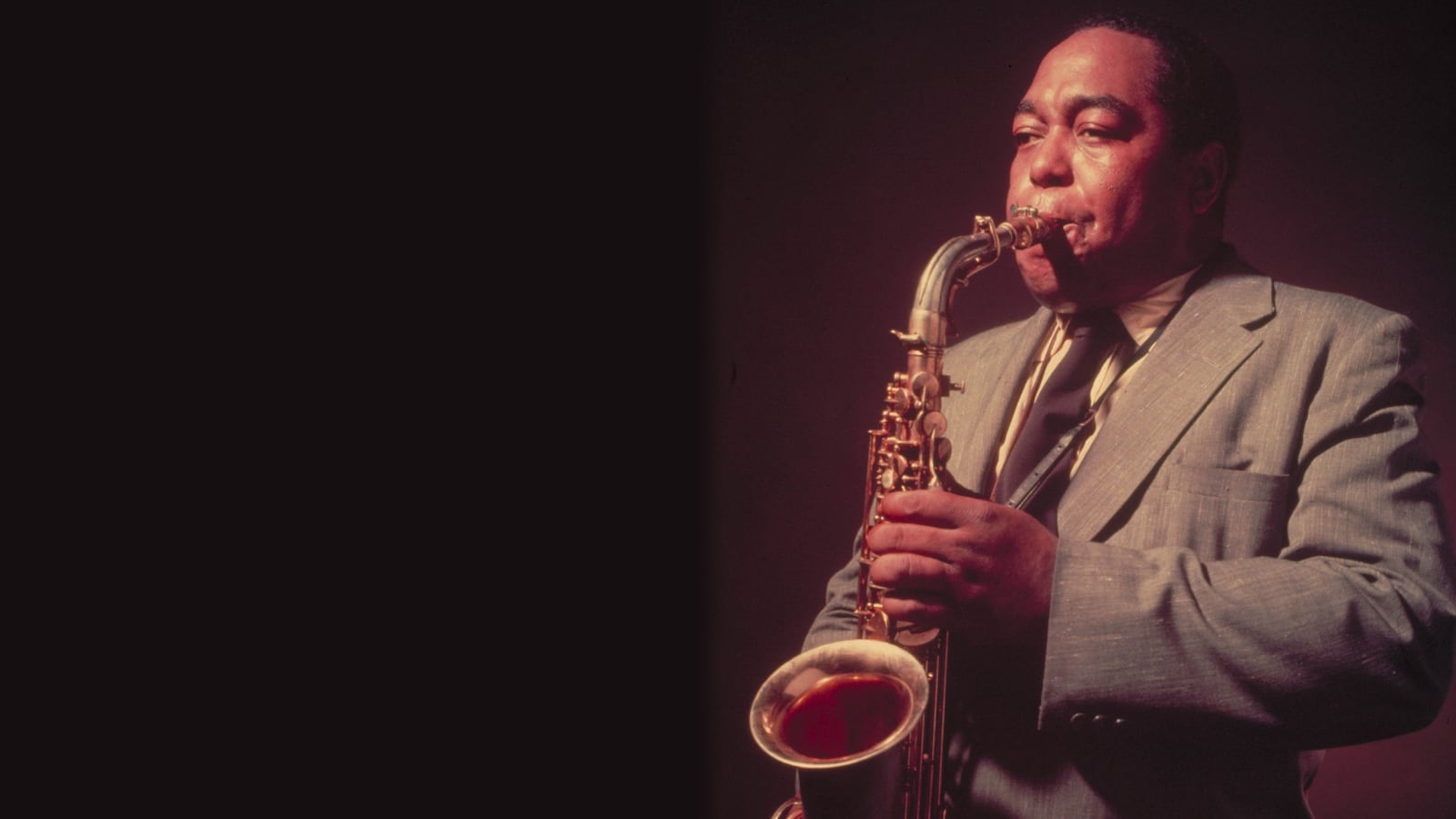You’re not going to have a jazz experience per se but I think you will have great insight into the life of Charlie Parker and have a better respect for his music and legacy and what he’s done.”
The loss of New York City Opera (NYCO) had led Opera Philadelphia to boldly step into the space where an opera company producing new and challenging works should be.
This past February it presented the East Coast premiere of Oscar, an operatic retelling of Oscar Wilde’s jail sentence for “gross indecency,” and tonight, Friday, it premieres Charlie Parker’s Yardbird, a chamber opera about the great jazz saxophonist by Swiss composer Daniel Schnyder and its librettist, award-winning poet and playwright Bridgette A. Wimberly.
The 60th anniversary of the death of Parker was marked in March, and the opera opens at the moment of his death, David B. Devan, general director and president of Opera Philadelphia, told The Daily Beast.
“In real life his body was in the morgue for two days before it was identified because he died in [jazz patroness and Rothschild heiress] Baroness Pannonica De Koenigswarter’s apartment and she didn’t want anyone to know Charlie Parker had died in her apartment,” said Devan. “So death gives him two days…to leave behind what he wants to leave behind.
“So he’s in Birdland and he visits, as this dead being, his three wives, his mother, Dizzy Gillespie—and he’s trying to write his opus because he also wanted to study classical music. That’s our story and that’s his journey. At the end of the opera he’s no longer a Yardbird, which is a penned-in bird that can’t fly. He finally flies by making a decision.”
Schnyder, an accomplished jazz saxophonist and classical composer, wrote the part of Charlie Parker for Lawrence Brownlee, one of the leading bel canto operatic tenors in the world.
Marked by long melismatic phrases and highly virtuosic and individualized vocal ornamentation, the pyrotechnic vocal displays in bel canto draw a direct parallel to the rapid fire musical lines of jazz, and especially Charlie Parker.
The music director of Opera Philadelphia, Corrado Rovaris, first had the idea of pairing Schnyder with Brownlee in 2011.
Devan explained, “Daniel pitched to Larry that he’d be Charlie Parker because he heard the range of his singing. Daniel is using parts of Larry’s voice that Larry doesn’t use much. Lower register notes…it’s not been anything like Larry has done before.”
Brownlee continued, “There’s no precedent for it. As a pianist if you play the piano you’re going to use all four octaves of that piano. You’re going to play everything from the highest notes all the way down to the bottom of the keyboard. Same thing is true with a jazz saxophone. You’re going to play really, really high and really, really low. So when I look at the part, and again the composer being a jazz saxophonist he uses the entire the instrument.”
As a vocalist, Brownlee said he is being asked to use “my entire instrument. Most singers sing within a 2-octave range, a little bit more than 2, but we have 2 octaves. That’s much different than a piano that has 4½—5 octaves. That’s a lot. He wants to use that element and his vocal writing mirrors that. When you look at what’s on the page, the accents…you can see it as a very instrumental approach to writing for the voice. So it’s a challenge for me to take what I have, my strengths, and try and adapt it for that.”
Opera Philadelphia gave The Daily Beast exclusive access to the final room run of the new opera last week. Although difficult to fully gauge the orchestral score from the piano reduction used in the rehearsal space, there were many truly riveting sequences in its approximately 90-minute run time.
At one point, Brownlee’s Parker and Dizzy Gillespie, sung by baritone Will Liverman, a member of Opera Philadelphia’s Emerging Artists Program, sing dueling vocal scat lines while Dizzy playfully flirts with Parker’s wife, Chan, sung by soprano Rachel Sterrenberg, and bickers with Parker over which musical lines are his creation.
The sequence has a dynamic immediacy and feeling of improvisation, of music and brilliance unspooling from the character’s minds in real time before your eyes. It successfully re-creates the electric element of improvisation that makes jazz so visceral.
But of course the scat lines were not improvised. They were written in the score. Which highlights one of the unique challenges for this piece.
“I think Larry’s one of the two or three only ones on earth who can sing it the way he’s singing it,” said Schnyder. “It’s too high for most tenors, but there are low passages, it’s over 2½ octaves, and it’s very rhythmically challenging. He also has to scat. When does a classical tenor ever do that?”
“I don’t really have a scat language, so I’m kind of learning on the fly,” explained Brownlee, “But I’m a big fan of singers like Ella Fitzgerald, Mel Tormé, even Al Jarreau and Nancy Wilson. So for me developing the scat language…because there are actual transcribed passages from Charlie Parker is a challenge. These things are virtuosity. Much of what Charlie Parker did is very, very fast. So some of these scat passages are very, very difficult.
“If I pick up the saxophone and play the fingering for the note A, it’s there. A voice is not quite that way. To travel from one note to the next and be able to cleanly, in tune with the right rhythmic intention, is not necessarily as easy as it is with a physical instrument. With a voice it’s a bit more difficult. So it’s been an education for me on how to find those things, to make sure they’re in tune and that they come out as if they’re improvisation.”
Brownlee realizes there could be some confusion with using the term “jazz opera” to describe the piece.
“People are going to come and say ‘Is this jazz?’ It’s not jazz. It’s classical music with jazz elements to it. But we’re at Opera Philadelphia, we’re not at Birdland,” he said. “But what I think people will appreciate is when they hear the motives, the remembrances, the writing, the things that point to the great works of Charlie Parker…You’re not going to have a jazz experience per se, but I think you will have great insight into the life of Charlie Parker and have a better respect for his music and legacy and what he’s done.”
Schnyder adds, “This is not a ‘jazz opera’ because the format is purely classical. The players are classical. Jazz players would have a very difficult time playing this music because it’s conducted music and geared towards a classical orchestra. Now, the format is classical but obviously I’m using a lot of musical idioms that are not classical, that stem from jazz, sometimes early jazz, jazz from the ’50s but also jazz from the ’60s, ’70s and ’80s, and even R&B elements and Latin. Because Dizzy sort of invented the combination of Latin music and jazz at that time. But if you ask me if it’s an opera for jazz musicians, I would say yes. They will have a tremendously good time listening and recognizing this tune here or that tune there or this little lick, so for them it’s a feast of recognizing a thousand things. Classical musicians will also have a lot of fun because Charlie Parker was into Stravinsky and modern classical music, so there are quotes that relate to that world too.”
Parker was a great admirer of classical music and particularly Igor Stravinsky and Hungarian composer and ethnomusicologist Bela Bartok, even saying of Bartok in a 1953 radio interview, “To my misfortune, he was deceased before I had the pleasure to meet the man. As far as I’m concerned, he is beyond a doubt one of the most finished and accomplished musicians that ever lived.”
Before his death Parker also spoke of studying classical composition and starting his own chamber orchestra.
Daniel Schnyder said, “That’s exactly why we wrote the opera. Because Charlie Parker’s mind was expanding in all kinds of directions and it was caged because of the [social] circumstances at the time. And we also reflect on our time now and how important it is that a society gives everybody a chance because otherwise you miss out on great achievement.”
Charlie Parker’s Yardbird is playing at Opera Philadelphia’s Perelman Theatre on June 5, 7, 10, 12 and 14. Go to www.operaphila.org for more information, though the entire run has been sold out for several weeks. The production, co-commissioned by Opera Philadelphia and Gotham Chamber Opera, will premiere in New York at the Apollo Theatre under Gotham Chamber Opera in May 2016.






